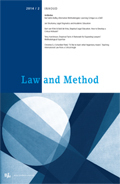|
Public law is sometimes said to deal with distributive justice. Such allocation issues are at least very dominant when public authorities grant only a limited number of public rights (authorizations, subsidies, etc.) and the number of applicants exceeds this maximum. The characteristics common to these ’limited public rights’ raise the question whether there are some general allocation rules applying to any allocation of limited public rights. This article shows how economic allocation theory can be helpful in constructing general allocation rules as a corollary of general legal principles. Allocation theory turns out to provide for general concepts and results clarifying general allocation rules and revealing mutual connections. Extending this allocation perspective from limited public rights to public law in general requires the hidden allocation issues in public law to be unveiled. |

| Article |
|
| Authors | Johan Mr.dr. Wolswinkel |
| AbstractAuthor's information |
| Article |
|
| Authors | Urszula Jaremba and Elaine Dr. Mak |
| AbstractAuthor's information |
|
This article addresses the problem of qualitative interviewing in the field of legal studies, and more precisely the practice of interviewing judges. In the last five years the authors of this article conducted two different research projects which involved interviewing judges as a research method. In this article the authors share their experience and views on the qualitative interviewing method, and provide the reader with an overview of the ‘ins’ and ‘outs’ attached to this tool, but also its advantages and disadvantages. |
| Article |
|
| Keywords | methodological challenges, doctrinal legal inquiry, source-usage, methodology, method |
| Authors | Mr. Marnix Vincent Roderick Snel LLM, MA |
| AbstractAuthor's information |
|
This article provides an overview of the methodological challenges that scholars are confronted with in relation to use of legislation, case law and literature commentaries within doctrinal legal inquiry. Therefore it employs a systematic literature review and a supplementary explorative expert-consultation among legal scholars of Tilburg University. Although the scope of the research is still limited, it shows that doctrinal legal inquiry is subjected to more and other methodological challenges surrounding the source-usage than one might expect. This insight may contribute to the further development of the meta-discipline ’law and methodology’ and simultaneously allows for more methodological awareness among doctrinal legal scholars. |


